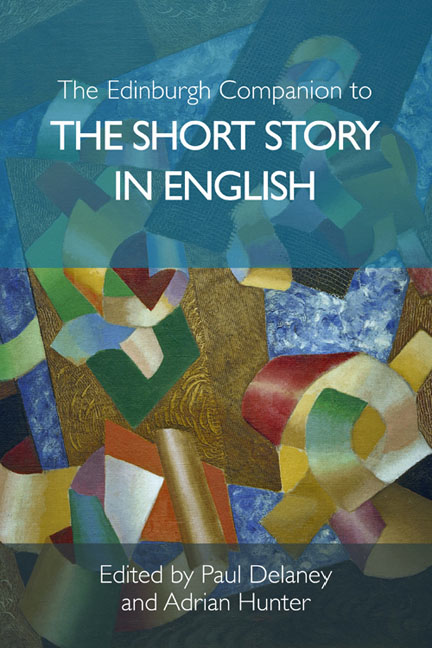Book contents
- Frontmatter
- Contents
- Acknowledgements
- Notes on Contributors
- Introduction
- Part I Historicising the Short Story
- Part II Publishing the Short Story
- Part III Forms of the Short Story
- Part IV Placing the Short Story
- Part V Identity and the Short Story
- 18 Gender and Genre in the Short Story
- 19 Diaspora and the Short Story
- 20 The Queer Short Story
- 21 Disability and the Short Story
- Index of Short Story Titles
- General Index
21 - Disability and the Short Story
from Part V - Identity and the Short Story
Published online by Cambridge University Press: 18 December 2019
- Frontmatter
- Contents
- Acknowledgements
- Notes on Contributors
- Introduction
- Part I Historicising the Short Story
- Part II Publishing the Short Story
- Part III Forms of the Short Story
- Part IV Placing the Short Story
- Part V Identity and the Short Story
- 18 Gender and Genre in the Short Story
- 19 Diaspora and the Short Story
- 20 The Queer Short Story
- 21 Disability and the Short Story
- Index of Short Story Titles
- General Index
Summary
STEPHEN KUUSISTO'S Planet of the Blind (1998) blurs the boundaries of genre. Marketed as a memoir, the text is divided into fragments of memory that are reminiscent of modernist short fiction; it also includes moments of intense lyricism which stand alone, almost as prose poems. Early in the text, Kuusisto describes his experience of visual impairment as being ‘like living inside an immense abstract painting’:
Jackson Pollock's drip canvas Blue Poles comes to mind, a tidal wash, an enormous, animate cloud filled with light. This is glacial seeing, like lying on your back in an ice cave and staring up at the cobalt sun.
There is a kaleidoscopic quality to this description which extends throughout Planet of the Blind. Kuusisto's writing moves fluidly between different forms of sensory perception and he insists upon the creative potential of a recumbent position. Visual impairment is represented as an intensely physical engagement with the changing quality of light and with one's surroundings. Rather than darkness or lack, it is portrayed as an alternative, potentially transformative way of experiencing the world.
Kuusisto's motif of lying on one's back and staring up at the sky is repeated in many short stories, including D. H. Lawrence's ‘The Prussian Officer’ (1914) and Virginia Woolf's ‘On Being Ill’ (1926). For Woolf, the experience of being an ‘invalid’, on the peripheries of society, leads to an enabling form of sensory acuity. Lying flat allows her to attend to the shifting beauty of the clouds: ‘We float with the sticks on the stream … irresponsible, disinterested and able, perhaps for the first time in years, to look round, to look up – to look, for example, at the sky.’ Her recumbent position reveals ‘endless activity … [a] gigantic cinema play[ing] perpetually to an empty house’. Woolf's account destabilises the boundary between autobiographical essay and short story but also, like Kuusisto's, challenges the hierarchy of the senses and the boundaries of realism:
The words give out their scent and distil their flavour, and then, if at last we grasp the meaning, it is all the richer for having come to us sensually first, by way of the palate and the nostrils, like some queer odour.
Lawrence's story also focuses on the relationship between visual perception and the shifting interior consciousness of a single protagonist.
- Type
- Chapter
- Information
- The Edinburgh Companion to the Short Story in English , pp. 346 - 362Publisher: Edinburgh University PressPrint publication year: 2018



